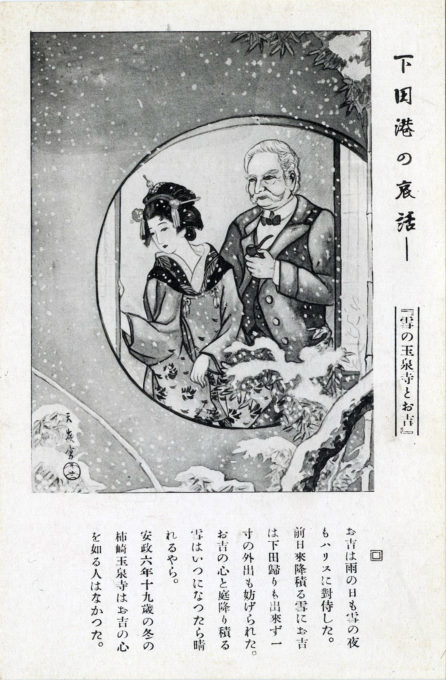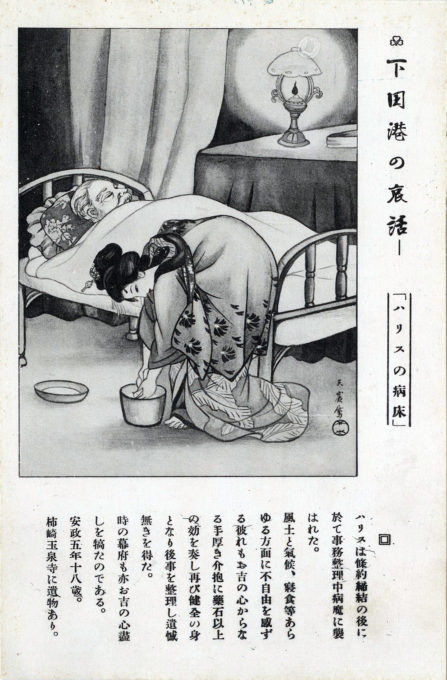“Commodore Matthew Perry pried open the door to Japan, and the first American to pass through it was Townsend Harris … Harris landed at Shimoda on Aug. 23, 1856 and established the first US Consulate on Japanese soil at Gyokusen-ji Temple.
“In addition to his consular duties, Harris was tasked with concluding a commercial treaty … His hallelujahs to the beauty of the countryside and the industry of the people counterpoint his criticism of Japanese officials.
“… Mendacity was part and parcel of the town’s two governors, Inoue, lord of Shinano, and Okada, lord of Bingo, temporizing: They intended to keep the consul in Shimoda sans a revised treaty. Harris, failing to receive satisfactory answers to inquiries about treaty revision, wrote letters to the Minister of Foreign Affairs requesting arrangements be made to receive him at Edo. The governors, with their necks on the line if they failed to keep Harris in Shimoda, feted him at their private residence on Feb. 24 in an attempt to soften his attitude. The lord of Bingo even offered to provide the American with a woman. Harris declined the offer, noting in his journal, ‘The lubricity of these people passes belief.’
Townsend Harris and Okichi. Popular fiction posits that Townsend Harris, the first US envoy to Japan, engaged the services of a local Shimoda prostitute. However, the reality of their relationship is far less lurid but not without its own tragedy.
“Harris’ frustration with the stonewalling exacerbated a chronic stomach disorder. In case he should be incapacitated, he appointed Henry Heusken, his secretary-interpreter, as his vice consul. ‘I have never been so ill for seven years as I am today,’ he notes on March 15. ‘Vomited a quantity of fresh blood.’
“Heusken, who cared for the bedridden Harris, asked a visiting Japanese official to provide a nurse for the consul. The Japanese had no conception of the word ‘nurse.’ The official interpreted the request as a plea for a romantic interlude. Overjoyed at the prospect of a liaison to bind the stubborn Harris to Shimoda, officials scoured the port for a suitable woman.
“Theirs was a difficult task, for it was said that barbarians sucked the blood of their bed partners. But a princely sum procured a 17-year-old woman named Okichi. She was a washerwoman, although laundering seafarers’ clothes was a front for her practice of the oldest profession.
“Okichi passed through Gyokusen-ji’s gate around June 15. The fastidious Harris perceived that Okichi was a fallen woman. He discerned boils beneath her makeup and would not let her near him. After three days he sent her home, ostensibly for treatment of her skin ailment.
“Okichi complained that by entering a barbarian’s home, she had become branded for life and could not even work as a washerwoman. On Aug. 29 she filed a petition for compensation. Harris gave her severance pay equivalent to the sum of her salary through mid-September. Harris was put out by the Okichi business. However, he let the matter drop because a fuss would only redound to his dishonor. But his reputation was stained all the same.
A bedridden Townsend Harris and servant Okichi. After Townsend left Japan, the people of Shimoda shunned Okichi, calling her tojin Okichi – ‘barbarian Okichi’. For a time, she lived in Kyoto before eventually returned to Shimoda where she opened a small restaurant. Okichi committed suicide in 1892, at the age of 51, by drowning herself near Shimoda.
“In 1928 Saburo Juichiyagi wrote the novel Karajin to Okichi (‘The Barbarian and Okichi’) drawing on putative historical records. Okichi was refashioned as a beautiful young woman who sacrificed herself to satisfy the barbarian’s lust and thus facilitate negotiations. The novel breathed a lurid exoticism into a moribund literary world — and it sold.
“The entertainment industry took up the story with a nationalistic, anti-American subtext suited to the times. Plays, films and recordings followed. After her very brief employment at the US Consulate, the real Okichi job-hopped, finally, with a patron’s assistance, opening a restaurant called ‘The Anchokuro’ in 1882. But, it closed shortly afterward and Okichi sank into beggardom at 49. She drowned herself two years later.
“Harris never took up the lord of Bingo’s offer of ‘female society.’ He remained celibate and the master of his libido. In this, as in perseverance, integrity and religiosity, he was remarkable. The Okichi story gained currency because it played to prewar nationalism, and also, perhaps, because its attribution of lust lowered Harris from the high moral ground.
“… In 1933, five years after publication of Juichiyagi’s novel, Bunki Murakami, then the abbot of Gyokusen-ji, discovered Okichi’s petition for compensation and a receipt from her, dated Oct. 9, for the severance pay from Harris.
“In the film Citizen Kane, the sled marked ‘Rosebud,’ the key to Kane’s psyche, goes up in flames and so remains an enigma to the reporter investigating the newspaper baron’s life.
“Likewise the petition and receipt — proof that Harris was innocent of a liaison in Shimoda — have been overlooked in favor of a flaming romance that keeps cash registers ringing.”
– “Shame and the Pious Pioneer”, by Burrit Sabin, The Japan Times, July 1, 2003
The Story of Townsend Harris, first US envoy to Japan, and Okichi.
1920s • Folklore • Historic Events
Tagged with: "Unequal treaties", Commodore Perry, Diplomatic relations, Okichi, Shimoda, Tokugawa era, Tokugawa shogun, Townsend Harris, Treaty ports
Please support this site. Consider clicking an ad from time to time. Thank you!



